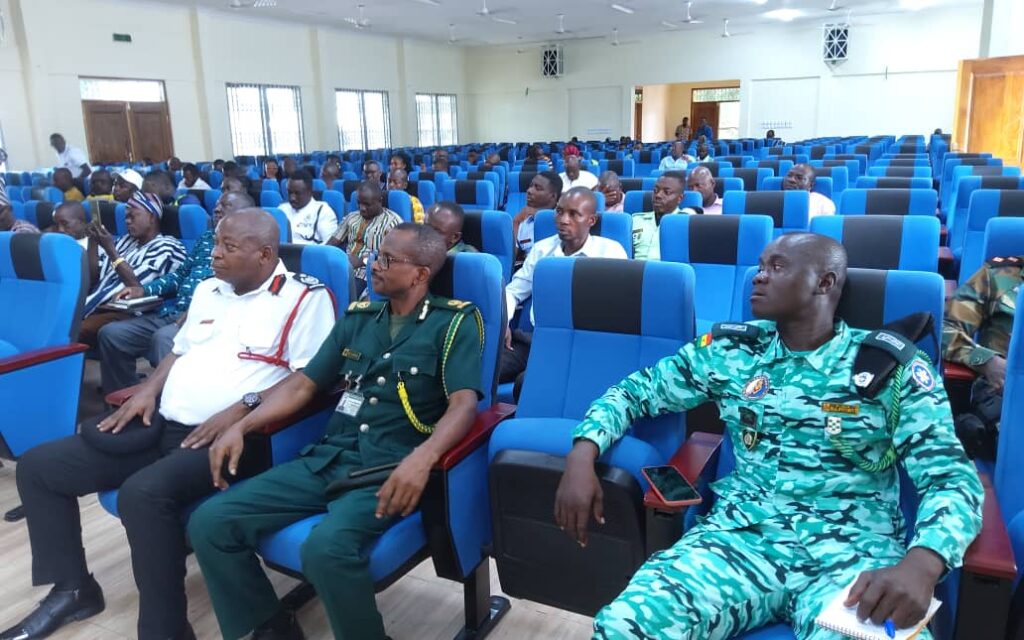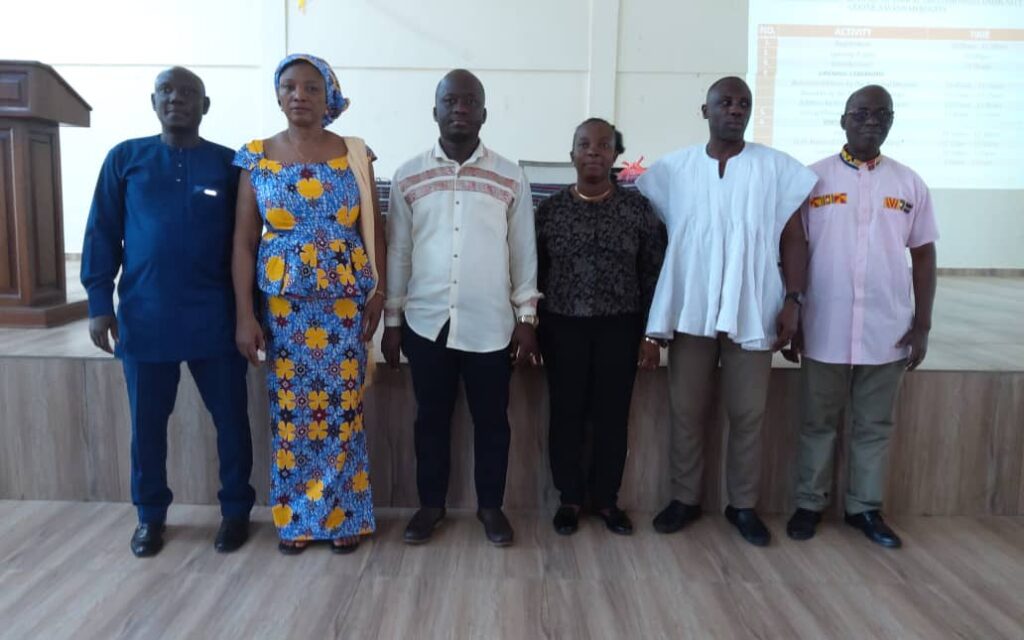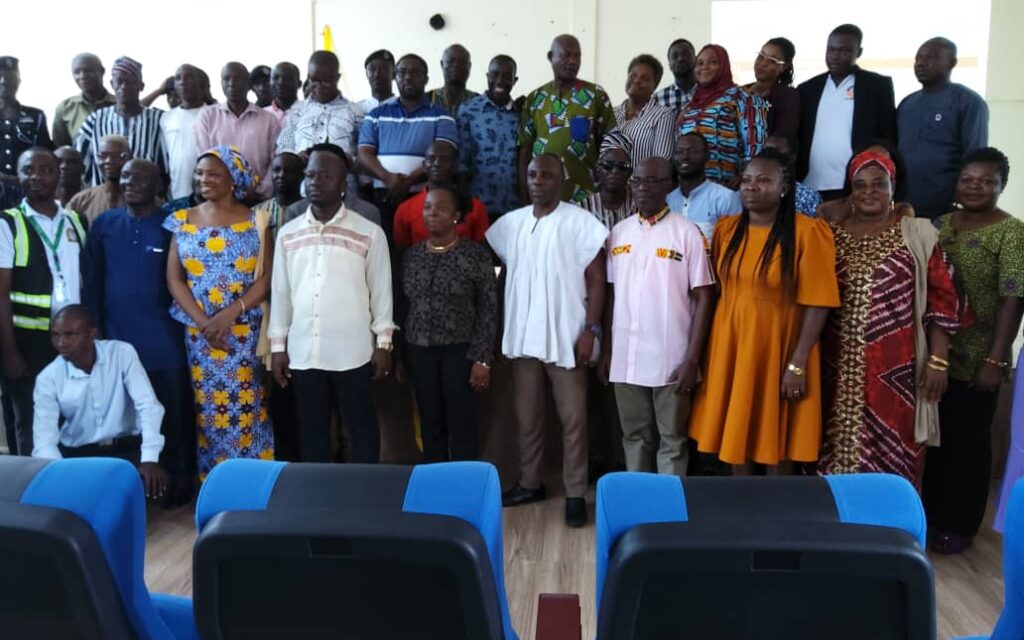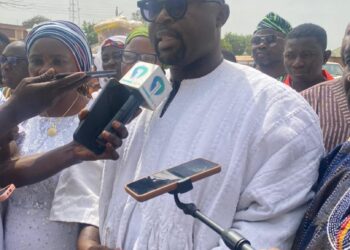The deputy minister of transportation made the statement at a stakeholder consultation forum held at Damongo in the Savannah region on Wednesday, 21st June, 2023 as part of the ministry’s regional consultation tour for the development of a National electric vehicle policy.
Delivering a keynote address, the deputy minister for transport, Mr. Frederick Obeng Adom admonished stakeholders to make useful inputs into the Drafting of the National Electric Vehicle Policy in support of the ongoing efforts to reduce the carbon footprint of the transport sector. “I implore all of you to be very proactive in your deliberations and make sure that you come out with workable Policy”.

He indicated that as the world moves away from fossil-fueled vehicles to electric vehicles, it is necessary that Ghana moves with the times to ensure that the country does not become a convenient dumping ground for used fossil-fueled vehicles.
He also explained that the transport sector plays a significant role in the improvement of the country’s economy but also contributes to greenhouse emission. “It is undeniable that the transport sector plays a crucial role in the smooth functioning of our economy and is essential in promoting social cohesion. However, just like the global front, Ghana’s transport sector has become a major source of greenhouse gas emissions”, adding that it is mainly due to the use of fossil fuel-based vehicles i.e., petrol- and diesel-powered vehicles”.

Experts have said that emissions from vehicles are not only bad for the planet, but they are also bad for health of the people. Air pollution has been partly blamed for cases of asthma, bronchitis, and premature death. The health impacts of localized air pollution have been studied to last a lifetime, with the effects borne out in asthma attacks, lung damage, and heart conditions.
The United Nations has warned that if global warming is allowed to rise above 1.5 degrees Celsius, it will have disastrous consequences. This suggests that cutting back on carbon emissions isn’t enough. It is therefore important that, the next logical step to put an end to the climate emergency.
In a presentation on behalf of the deputy minister of energy at the stakeholder consultations on draft national electric in Damongo, Madam Doris Duodo Said the “event provides us with the opportunity to take ideas, inputs and comments from you to enrich and make this document complete”, noting that “This is a Global problem and global problems calls for global solutions. And Ghana is not left out as we are a party to Paris Agreement and our commitment to climate emissions”.

She commended the Ministry of Transport for this giant step they have taken together with other agencies to put together a document to guide the use of electronic vehicles’ (EV’s) in Ghana.
She said together with the Ministry of Energy, they shall collaborate and push for the agenda to come to a realization by ensuring that good policies are put in place to guide and drive this new market that is being created to save mother earth.
The recent report of the Intergovernmental Panel on Climate Change (IPCC) makes it clear that the world has less than 10 years to switch to renewable energy to avoid catastrophic climate change.

The Drive Electric initiative will enable the increase in electricity intake and as such increase the much-needed demand that is needed to reduce or eliminate the payment of high-capacity charges while meeting climate targets.
Addressing what the electric drive offers Ghana, Madam Doris Duodo stated that “The National Energy Transition Framework as part of its decarbonization activities seeks to promotes and ensure the use of electric vehicle as an alternative cleaner efficient means of transportation, the use of electric vehicles in the country will promote renewable energy and also contribute to reduction in pollution”.
Outlining some steps and survey findings in Ghana to back the initiative, she mentioned that Ghana has four level 2 charging stations, available to the public but all are located in Accra with one POBAD charging station located at the A&C Mall in East Legon, two Porsche charging station located at Palace Mall and Kempinski Hotel respectively and Total Energies charging station located at 37, and however indicated that maintenance and repair are in short supply in Ghana.

She sated that Only three (3) EV dealerships reported having functional service facilities and well-trained technicians but many more dealerships are willing to venture into EV maintenance with the appropriate training and support.
According to the International Trade Centre, about 17,660 Plug-in Electric Vehicle (PEVs) were imported into Ghana between January 2017 and December 2021. Imported motorized Electric two & three- wheelers (E2&3W) during this period was 9,431 units with most (98%) of the Battery Electric Vehicles (BEVs) being imported from China.
In 2021, the Ghana Revenue Authority (GRA) reported that standard hybrid-electric vehicles (HEVs) have the highest representation (91.5%) followed by BEVs at 5.1%. and plug-in hybrid electric (PHEVs) at 3.3%.
Hon. Veronica Alele Herming, DCE for the Bole District who delivered a speech on behalf of the Savannah Regional minister stated that the stakeholder’s consultation provides the forum to discuss the modalities, challenges, and opportunities for promoting electric vehicles in the country.

He also urges participants to be open-minded, constructive and collaborative discussions to arrive at a actionable solutions towards achieving a sustainable environment in Ghana.
In addressing climate change in Ghana, the Hon. Regional minister said “it is imperative for Ghana to take an active role towards achieving a sustainable environment for the future generations but unfortunately, they in the Savannah Region have not been able to manage their natural environmental very well as a result of illegal logging, commercial charcoal burning, and bush burning among others bad environment practices.
He added that, the transportation sector contributes significantly to greenhouse gas emissions and global warming hence the government of Ghana to develop a draft electric vehicle policy to promote the adoption and use of electric vehicles in the country.
“The National policy development process, calls for extensive consultations to solicit inputs from relevant stakeholders. The first phase of this Consultative process will see the engagement of Stakeholders from Regional Administrations, Ministries, Departments and Agencies, private sector organizations, civil society organizations, transport operators among others. During these workshops, views of participants will be solicited and would be adequately captured in the EV Policy going forward”.
“The next phase of the consultative process will be Focal Group consultations with key interest groups such as Vehicle Assemblers/ Manufacturers, Transport Operators, Spare Parts Dealers and Garages, the National Council of Persons with Disabilities, Parliamentarians, the Media and Civil Society Organizations (CSOs). This is to ensure that the views of all transport users are taken on board in the Policy”. The Deputy Minister of transport indicated.
Source: Padfm.com.gh/Gogu Edwin

















